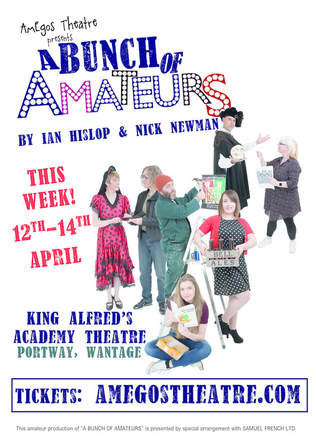|
A BUNCH OF AMATEURS by Ian Hislop and Nick Newman
AmEgos King Alfred's Academy Theatre, Portway, Wantage, OX12 9BY 12-14 April 2018 A Bunch of Amateurs, by the long standing comedy writing duo of Ian Hislop and Nick Newman, was originally written for the big screen and premiered in 2008 at that year's Royal Film Performance. It boasted a big name cast that included Burt Reynolds, Derek Jacobi, Imelda Staunton and Samantha Bond and was an immediate hit with H.M. The Queen, so much so that she asked for a further screening at Sandringham that Christmas. It tells the story of washed-up Hollywood action hero Jefferson Steel, who hopes to reignite his waning career by accepting an invitation to play King Lear at Stratford. But he discovers on his arrival in England that he will not be performing with the RSC, but with the Stratford Players at Stratford St. John in Suffolk, who hope that Steel's presence in their production will help raise money to save the local theatre from being bulldozed for executive homes. This is character-based comedy and has the feel of a TV sitcom about it (and that's not a criticism), and Hislop and Newman have given us some beautifully drawn characters. So how did AmEgos' production of the stage version play out to the good people of Wantage and beyond? Very well, as it happens. This was a well cast performance in which the actors seemed to have really inhabited their roles and made them believable, even though, being a farce, the plot itself required a certain suspension of disbelief. At the centre of the action was Jefferson Steel himself, played by Stephen Rees, whose New York accent did not slip once; his cynical, sardonic ripostes to the inhabitants of what he termed 'Loserville' hitting the spot time and time again. Jefferson's transformation from hard-bitten egotistical star, to a man who has overcome his personal demons and reconciled with his estranged daughter is skilfully played by Stephen. His shambling, shuffling physicality, that caught this character, reminded me a lot of Ian McShane as Lovejoy. Jefferson's rival is Nigel, the local solicitor, who wanted to play Lear himself. His constant sniping remarks about Jefferson's lack of acting ability and personal shortcomings, both to his face and behind his back, were brilliantly delivered by Duncan Sinclair, who had this annoying, pompous and ridiculous figure of to a tee. Nigel is a wonderful comic creation, based on a type of character that we've all encountered at some time – someone with a measure of talent, but who over-estimates how much talent he has, and how much credibility he loses by constantly boasting of his own past thespian achievements. The Stratford Players' director Dorothy was played by Lesley Phillips who was, in a funny twist, also the director of A Bunch of Amateurs. So she was directing herself directing a play. Dorothy is used to being obeyed and faces down Jefferson Steel with his celeb tantrums from the start. In the end, the reformed Jefferson proves to be a romantic magnet for her. Lesley convinced as the character who drives much of the play's action, having to deal with, and negotiate around, the quixotic behaviour of her band of performers. Her character's confidence was rightly more grounded than the puffed up self-belief of either Jefferson or Nigel, and Dorothy's centredness, as played here by Lesley, is what gives this ensemble piece much of its gravitational pull. I liked Rob Thorpe's interpretation of Denis, the local plumber who acts as set-builder, electrician and general odd-job man for the Stratford Players. In addition to which, Denis is playing the Duke of Gloucester in Lear, and one of the running gags of the play are his inappropriate special effects solutions to the blinding of Gloucester. But Denis was never happier than when he was discussing the technical merits of different brands of nail gun with a nonplussed Jefferson. Rob gave us a techie in Denis who was oblivious to social appropriacy. Quite right too. Mary is a lady of a certain age who is besotted with Jefferson Steel, but the feelings are not mutual. Her growing sexual frustration and jealousy towards other women, who seem to have won Jefferson's attention, leads to clouded judgement and a misunderstanding that results in what Hollywood scriptwriters term the 'all is lost moment'. In this case it was a compromising tabloid newspaper report that disgraced Jefferson and threatened to derail the whole King Lear production. Helen Harding gave us a Mary who became increasingly desperate and bitter, and more hilarious, as the play progressed. Her emotional frustration and jealousy went head to head with her natural decency and modesty, and the internal conflict was a joy to watch. Stratford Players' main corporate sponsors are local microbrewery Bell Ales, who have paid for Jefferson's flight and other expenses. The owner's wife Lauren appears with samples of the brewery's beers and is keen to get photos of Jefferson sipping the product (he spits it out in disgust). Later on, her physiotherapist's skills deployed on Jefferson's aching lower back are misinterpreted by Mary as more than just remedial medical treatment. Sam Winskill played Lauren in a well judged performance of part-PR person for a local small business and part-budding amateur actress who just wants to make sure the Stratford Players are successful. Georgina Volkers was Jefferson's estranged teenage daughter Jessica, and although the American accent sometimes drifted in and out, her characterisation of a girl who is resentful of her father's neglect and general uselessness as a dad worked well. Georgina brought us a range of facial expressions that said WTF about her stage father in so many different and amusing ways. Lesley Phillips chose a sparse set in which to stage 'Amateurs' and I, along with some other audience members I spoke to, thought this was the right choice. Credit therefore to Rob Thorpe, John Gale and Elliott Winskill for constructing it. With a more minimal set, lighting becomes all the more important and Lucy Bailey gave us the right emotional moods against a predominantly black backdrop. The interspersing of scenes with Shakespearean songs that referred to the action just finished was a nice structural element. One of the characters wearing the Fool's cap performed this under a spotlight with a freeze-frame tableau of the last scene in the gloom behind. Co-writer Nick Newman has said that the play is about the redemptive power of theatre. If that was the aim, then farce was perhaps not the most appropriate genre in which to realise that message. I would say rather that it was about a man learning humility and how to love, with theatre as the occasion rather direct cause of that redemptive process. One reservation I had with it, though, was the way that all obstacles were conveniently overcome and all characters were reconciled at the end. There was too much of the Hollywood fairytale happy ending, devised to make a point, about it for my taste. Having said that, this was farce, and the well-drawn characters and the chemistry of their rivalries, loves, envies and frustrations were enough to justify the ticket price alone. Congratulations to AmEgos on another success!
0 Comments
Leave a Reply. |
About the Author
Mike Lord has been involved with amateur theatre for over twenty years, mainly as an actor but also, more recently, as a director. Archives
July 2019
Contact me
Please use the Contact Form for anything apart from comments on blog posts. |


 RSS Feed
RSS Feed
